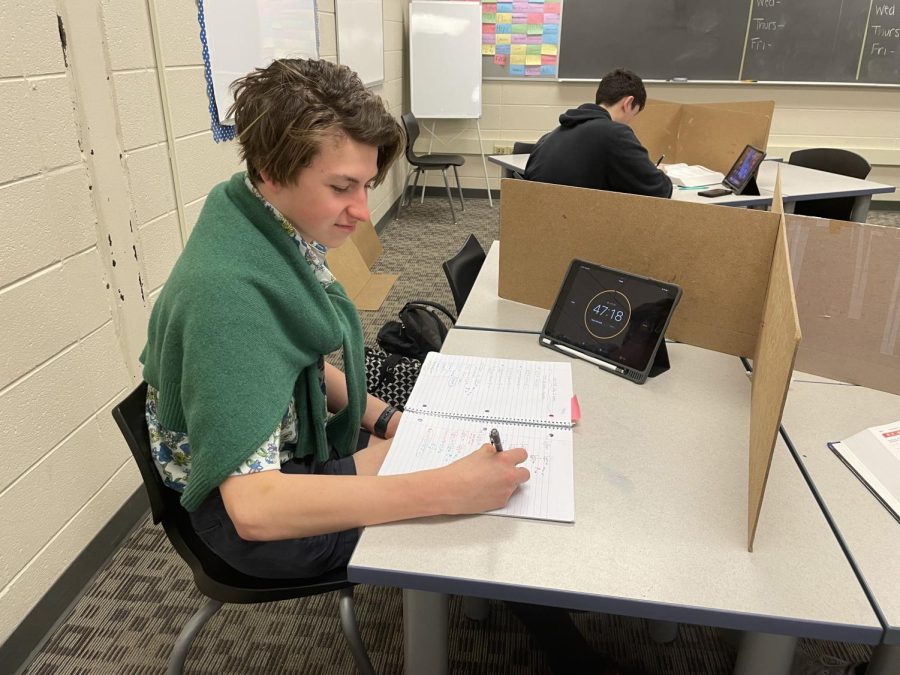Learning with mental illness
ADHD, anxiety, depression receive 504 plans
Photo by Emma Harper
Caiden Schuring, sophomore, works on an assignment with the extra time he gets from his accommodations. Schuring says that his accommodations are helpful in completing his schoolwork. He usually gets about an hour of extra time to complete assessments.
1.5% of students nationwide have a 504 plan, according to an analysis done by The Advocacy Institute, and 14% of students grades K-12 in the US have an Individualized Education Program (IEP), according to the Pew Research Center.
Students with 504 plans can have mental, physical, or academic disabilities, commonly with ADHD, anxiety, or depression, but they do not need special education, according to Cara Obrochta, assistant principal of student services. Additionally, an IEP gives students specialized instruction to meet academic or emotional needs.
“[Accomadations are] based on that individual and what their needs are. So every IEP is different. It’s not a standard stock ‘you have a disability here’s what this looks like’. It really depends on where those deficit areas lie, some students receive social work services or speech services, occupational therapy, so it is just dependent on where those needs fall for that kid,” Jennifer Fischer, case manager said.
504 plans and IEPs do not just deal with mental illness, but they are a way students with mental illness are helped in school.
“It’s really just evening the playing field based on where the kids’ deficits are,” Fischer said.
One way 504 plans and IEPs help students is through accommodations. Caiden Schuring, sophomore with ADHD, has a 504 plan that gives him extended time to do assignments; he can go on walks if he feels antsy, chew gum, and his teachers must communicate very clearly with him and his parents about instructions and if he is getting behind.
“I think it’s really helpful. Sometimes I’m like, ‘This is so annoying, why do my parents get called?’ But I think overall, it’s really beneficial for me,” Schuring said. “I think [if I did not have accommodations it would] be way more challenging to be able to thrive in certain situations like taking a math test or doing math homework, so I think it’s way easier for me to be able to be like this is what I need to do today. It helps with timing.”
“I think it’s very parent based, like my parents, communicate with me, but that might not be the case for everyone. So my parents were like, ‘is this what you want?’” Schuring said. “So I think that it [would be good to] cc emails so that at least [students] get to see it too. If not everyone’s parents communicate with them what’s going on.”
Dupee also thought that the process relied on parents and thought that greater student voice in the matter would be beneficial.
“I think they can try and involve us a bit more, because at least for mine, it was mostly just teachers and my parents [involved in the process]. They were [not really] asking questions about how I feel in all of my classes,” Dupee said.
Although some students take issue with 504 plans, others believe that they are very helpful.
“I think that it’s a good system they have going on, it’s very customizable,” Schuring said. “What works for me might not work for [others] and what works for [someone else] might not work for me. So everything for the 504 plans is very customizable. It’s what the individual needs.”

For her third and final year on the Bear Facts staff, Emma will be serving as Magazine Editor-in-Chief for the first time. After high school, Emma hopes...

